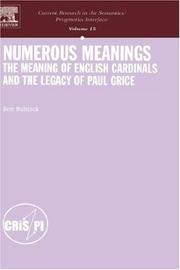| Listing 1 - 1 of 1 |
Sort by
|

ISBN: 1280630175 9786610630172 0080456790 9780080456799 9780080445571 0080445578 0080445578 Year: 2005 Publisher: Amsterdam Elsevier
Abstract | Keywords | Export | Availability | Bookmark
 Loading...
Loading...Choose an application
- Reference Manager
- EndNote
- RefWorks (Direct export to RefWorks)
Outlandish as it may seem to the uninitiated, the meaning of English cardinal numbers has been the object of many heated and fascinating debates. Notwithstanding the numerous important objections that have been formulated in the last three decades, the (neo-)Gricean, scalar account is still the standard semantic description of numerals. In this book, Bultinck writes the history of this implicature-driven approach and demonstrates that it suffers from methodological insecurity and postulates highly non-conventional meanings of numerals as their "literal meaning", while it confuses the level of lexical semantics with that of utterances and cannot deal with a large number of counter-examples. Relying on the results of an extensive corpus-based analysis, an alternative account of the meaning of English cardinals and the ways in which their interpretation is influenced by other linguistic elements is presented. As such, this analysis constitutes a prism that offers todays linguist an iridescent history of one of the most fascinating, if often misconstrued, topics in contemporary meaning research: the conversational implicatures.
English language --- Cardinal numbers. --- Arithmetic, Cardinal --- Cardinal arithmetic --- Cardinals (Numbers) --- Numbers, Cardinal --- Set theory --- Transfinite numbers --- Numerals. --- Semantics. --- Semasiology --- Nominals --- Grice, H. P. --- Grice, Paul --- Cardinal numbers --- 802.0-56 --- 802.0-56 Engels: syntaxis; semantiek --- Engels: syntaxis; semantiek --- Numerals --- Semantics --- Lexicology. Semantics --- Grice, H. Paul --- English language Semantics --- Germanic languages
| Listing 1 - 1 of 1 |
Sort by
|

 Search
Search Feedback
Feedback About UniCat
About UniCat  Help
Help News
News